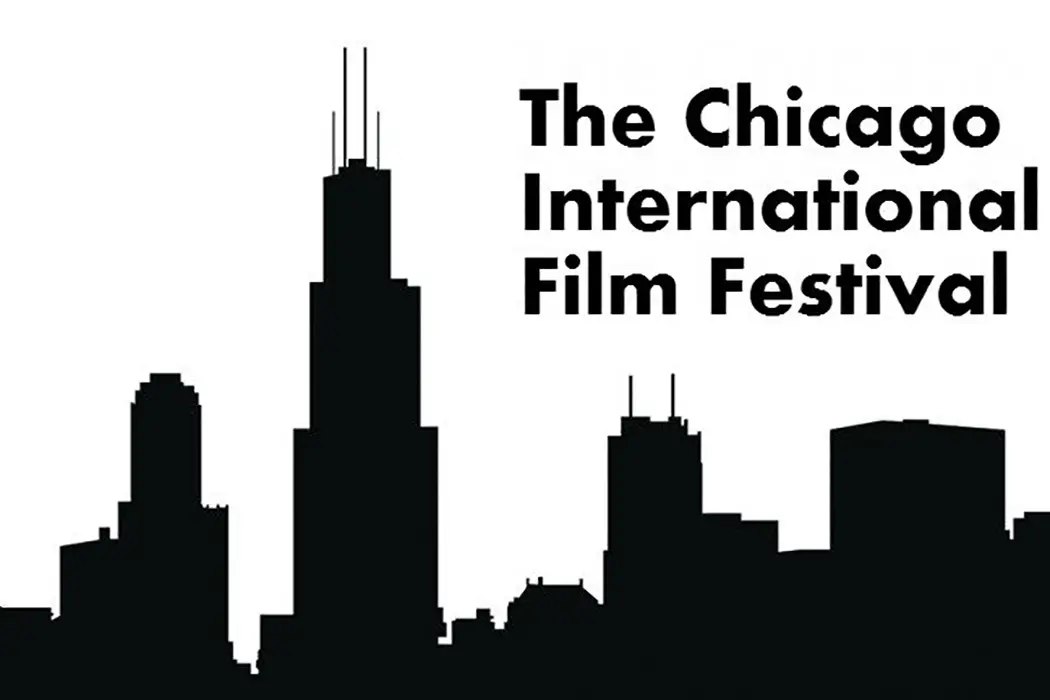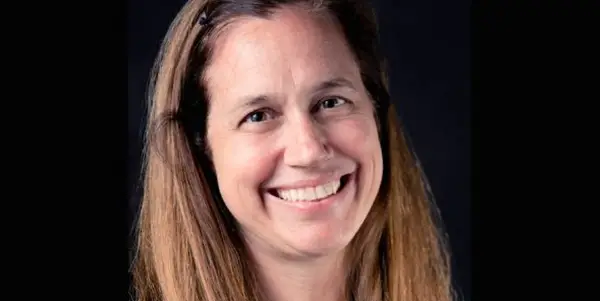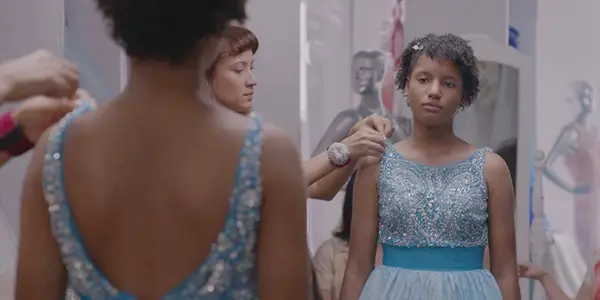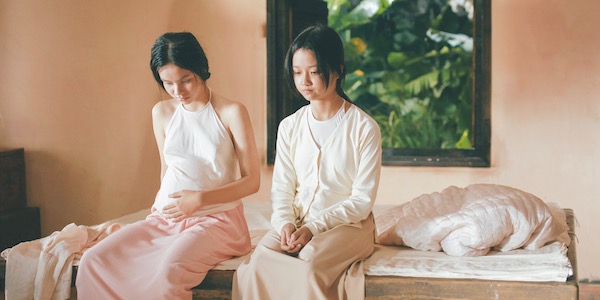Interview With Chicago International Film Festival Artistic Director, Mimi Plauché

Laura Birnbaum is a proud film critic and writer from…
Chicago International Film Festival Artistic Director, Mimi Plauché, took time to speak with Film Inquiry this week to discuss this year’s festival. We spoke about her experiences growing up in Chicago, her deep connection to film, and her vision for the future of CIFF.
Laura Birnbaum for Film Inquiry: I thought we could start off by talking a little bit about how you came to be where you are as the Artistic director at Cinema/Chicago. Could you give some broad strokes about your background – where you grew up and about the role film & art played in your life at different stages?
Mimi Plauché: Yes, so I grew up in Evanston and grew up with parents who loved all kinds of cinema, music, and theater so I was very fortunate in that way. Not only did they love it, but they always took the approach that, if they wanted to go to see something of go to a concert or museum, that my brother and I were also going to accompany them. Whether it was a foreign film or there were subtitles where I’m sure at some point I was too young to be reading them that quickly, they never hesitated to take us with them. I think early on, I was exposed to a lot of great cinema as well as art and music and performance. I developed an appreciation for that. I was always a kid who wanted adventure and I found that, whether it was through reading or watching film, experiencing different cultures, places, and people really inspired me, particularly with foreign cinema. It helped me understand that there’s a way to experience or see the world beyond the place that you live or the people that you interact with.
What were some of your earliest or most affecting experiences of interacting with art and film during those earlier times?
Mimi Plauché: There are films that I remember being quite moved by as a kid, like Sophie’s Choice or Ingmar Bergman films – it was more of the emotion or the feeling rather than the story. I think particularly with the foreign language it was more the look of the film rather than the details of it, but I think of those moments often and they have certainly stayed with me. You know, we just did a tribute to Bill Friedkin last night, and I have strong memories of being at my friend’s house and watching The Exorcist with my friend’s grandmother or going with my parents to see The French Connection. I have very strong memories of his films from my childhood. But also, I even have a great love of James Bond films because we would always go out to see those when they came out, so it wasn’t just that it was arthouse, but what we were brought to was very eclectic. Even at The Art Institute, art wise, I remember early on in my life seeing a Toulouse Lautrec exhibit that really stayed with me – the colors and the images. So yeah, there are certain moments that have continued to resonate. Another moment is – I have a very distinct memory of being taken to a dramatic reading of Edgar Allen Poe‘s “The Raven“.
[Laughter] Well that will affect anybody.
Mimi Plauché: Yes! [Laughter] Anybody!

Chicago is known for many things, but a resounding and very proud feature engrained into this city is film. Film Inquiry has a global audience who I’m sure is interested to hear about what Chicago, and this fest in particular, has to offer. What, in your opinion, makes Chicago such a great home for cinephiles and why should people visit the fest?
Mimi Plauché: I will say that I am really excited about what’s happening right now in the city in terms of film production. More and more filmmakers are staying here, particularly independent ones, and the growth of the television industry in Chicago has been a great support for a lot of the independent filmmakers as it gives them the ability to stay here and work on their own projects. That’s one development that I think is really exciting because we’re seeing more and more great production coming out of Chicago. I think that only contributes to the overall film scene. Otherwise, whether it’s the festival or the great venues from the amazing film centers to The Music Box or The Nightingale, that there’s great opportunities to see new, international, independent films. One of the things I love about Chicago audiences, which we see during the festival, is that they’re willing to take a chance on a film that is unknown or to see a film from a country that they’ve never seen a film from before. The other thing I’ll say is the audience’s willingness to engage with the work. We hear from many of our filmmakers who come that how surprised they were by, not only the level of engagement during a Q&A after a film, but how many people want to stick around after in the hallways and just continue to ask questions.
That’s wonderful.
Mimi Plauché: Yeah, we’ve had that happen over and over again. We just had an Egyptian filmmaker show one of his documentaries, and he said that everyone wanted to take him out afterward, and at some point he said, “Okay, I think it’s time to move past talking about myself, we can just talk.” *laughs*
I love that! It makes me so happy to know that we’re leaving such a good impression and that they feel welcomed.
Mimi Plauché: Yeah, and they also fall in love with the city too. We always have a number of people say that they would love to return to Chicago to do some work, and we always make sure to introduce them to the right people and places in hopes that they will return.
There is such a wide and diverse cast of those involved in the creation of the films being showcased at CIFF. How do you and your team work toward incorporating such diverse content?
Mimi Plauché: I think one of the mandates of the festival, our mission, is to basically through film, to have a meaningful cultural exchange and one of the things CIFF has always been known is our broad international content. So I think first of all there’s a true appreciation and love of film from around the world amongst the programmers and we’re getting more and more films from around the world to consider every year but we’re always tracking trends and we have interns who are solely focused on that. We’re always tracking what’s happening around the world so that we can really showcase the diversity of filmmaking from different regions and different types of filmmakers, whether it’s on their style of storytelling or visual style.
That’s great. I definitely picked up on everyone’s love for global cinema at the Press Breakfast. I was so impressed by how open and excited you guys were about the things going on at the festival.
Mimi Plauché: Oh yeah, we all love cinema and I think one of the things that is so rewarding about our jobs is the ability to bring films that we love to Chicago audiences but also to support the work of filmmakers who we really believe in.
Speaking of diversity in film, it’s inspiring to see so many women raising their voices to challenge some of the systems in Hollywood that have hurt them or held them down. Viola Davis spoke on this the other night at the Widows premiere, stating that there is a big movement in this area and that “women are beginning to re-define what strength is.” What does strength look like to you and what advice do you have for women in media who are facing adversity in their positions?
Mimi Plauché: I think it’s taking leadership by example, but I think standing up for what you believe in and joining together and finding women but also men coming together and taking a stand together. I think it’s not an individual effort on its own but kind of working together and coming together and not just being concerned about your own positions but rather on the overall, broader spectrum. Also, one of the things I’ve been so inspired by in countries around the world, whether its government film, commissions or institutes, or even governments passing laws where there’s a mandate to get to 50/50. just starting a few years ago, we started the mandate to have 50/50 by 2020 and just making that commitment and really changing the overall rules and expectations and that being something that’s always under consideration to create a more level playing field. A lot of places are following suit.

Is there a film coming up that more people should see? Or perhaps a film that has already been shown at this year’s festival but that people should look for upon its full release?
Mimi Plauché: There are a lot of hidden gems in the festival. I always encourage people to especially see films in our New Directors Competition and our Documentary Competition because these are made often by first or second time filmmakers and there’s a real diversity, just under 50% of them having been directed by women. These are the up and comers and these are the people we see demonstrating incredible talent at an early stage. They’re the ones we should be looking out for in the future. For example, we have a really beautiful film that’s premiering tonight called Miriam Lies about a teenage girl in the Dominican Republic and it’s the eve of her Quinceañera. She’s mixed race and she’s caught between all these different worlds that hold different expectations of who she is and who she should be. I think it’s a really sensitive film that deals with a lot of issues and handles it in a really delicate way. It was one of the more surprising films of the festival. I think many of the films in the documentary competition feature a lot of films that take on a different documentary form, so it’s very cinematic but they also introduce us to other people, places, or issues in the world. They are able to encourage you to think about a subject and challenge what you think about what a documentary can be and expand that horizon for audiences.
That’s very impressive. Wasn’t it Roger Ebert who spoke on film being a window into different parts of the world?
Mimi Plauché: Yes, I think he also called it an empathy machine, which enables us to experience people who are very different to us, because through film, we can understand their situation, so it is absolutely a window into their world, yeah.
What do you personally envision for the future of CIFF?
Mimi Plauché: I think we’ve made some strides and we’re continuing to sanction our connection with the Chicago community and the Chicago audience so that each of the cultural institutions are supporting the other. We have a really wonderful education program with about 7000 Chicago Public School students every year and, again, thinking about the way in which film has the capacity to impact our understanding of the world or our connection with the world. We want to continue to sanction the way in which we are able to showcase the work through our programs so as to not only encourage up and coming filmmakers, but to also have a meaningful impact on their career trajectories.
Well, that’s great. It sounds like you guys are fostering such a beautiful and open environment for people to create openly and without abandon.
Mimi Plauché: Thank you.

So finally, if you could frame and hang a single, still image from any of the films in this year’s lineup, what would you put on display?
Mimi Plauché: [laughs] Wow, that is a great question! I’m thinking of one of the films that was the most striking, visually for me. This film is by a first time Vietnamese filmmaker from our New Directors Competition – it’s called The Third Wife.
Yes! I’m very excited about that one.
Mimi Plauché: Yeah, there are so many still images from that film that could be chosen. The cinematography is just so exquisite. I think the imagery it really contributes to the emotion of the film and of the young woman who is the center of it. There are a lot of really wonderful ‘family at the beach’ scenes whether they’re falling apart or coming together. It’s quite profound – I really encourage people to see it.
CIFF just finished its 54th festival year in Chicago. For more information, you can check out the Festival Page.
Does content like this matter to you?
Become a Member and support film journalism. Unlock access to all of Film Inquiry`s great articles. Join a community of like-minded readers who are passionate about cinema - get access to our private members Network, give back to independent filmmakers, and more.
Laura Birnbaum is a proud film critic and writer from Chicago. When she's not watching independent horror films, she's likely smoking a cigar on a rooftop somewhere, thinking about which indie horror film to watch next.













